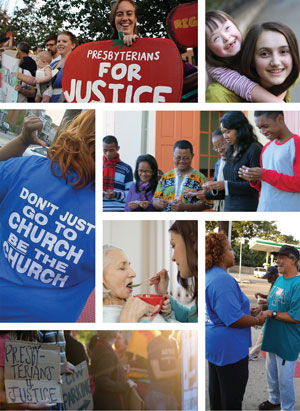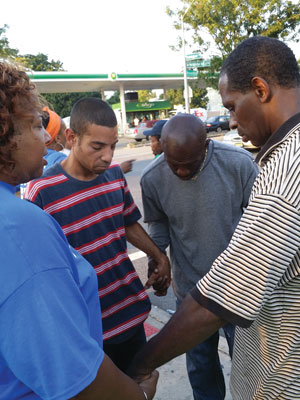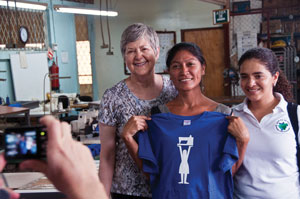‘And They’ll Know We Are Christian by Our Love’
Being evangelists by being disciples—one young adult pastor’s perspective
by Ginna Bairby

Recently, something very strange has been happening to me. It started in late June, in the days following the conclusion of the 221st General Assembly (2014), and continues to this day: people have been going out of their way to ask me questions about the Presbyterian Church (U.S.A.).
These questions have come from old high school classmates, college friends, even a couple I met at a wedding.
For the most part, these people haven’t been fellow Presbyterians. They haven’t even been friends from other denominations or faith traditions. No, most of these questions are coming from people who either left the church a long time ago or were never a part of organized religion to begin with. These are the notorious “nones,” whose growing numbers have recently garnered considerable media attention.
And this is what they are saying to me: “You’re Presbyterian? That’s the church that just approved gay marriage, right?”
I suppose the question shouldn’t surprise me. After all, the PC(USA) did make the New York Times and other major news outlets with our General Assembly’s vote in favor of marriage equality. Specifically, that assembly did two things: it voted to send to the presbyteries for approval new language for the Book of Order, defining marriage as between “two people” rather than only “a man and a woman,” and it voted to allow pastors in states where same-sex marriage is legal the discretion to perform such ceremonies if they feel so called. It’s a huge deal—a foundational and game-changing moment for both the church and society.

Jose Gomes of Huerto de la Familia pots pepper plants. With funding from the Presbyterian Hunger Program, Huerto de la Familia seeks to deepen food justice in its community.
What has caught me off guard, however, are the words of hope and excitement that follow the questions: “That’s so wonderful!” “That gives me so much hope.” “I’m so excited for the Church!”
A lesbian couple who told me they hadn’t been to church in years responded, “Maybe we need to go to one of those churches!”
Leading people to Jesus
I recognize that not all of you reading this will agree that the General Assembly votes on marriage equality were the right decision. But stay with me, because the point I’m trying to make is bigger than that.
If I understand what’s taking place in these conversations, people outside the church are taking interest in learning about or becoming part of the PC(USA) because they see us standing for justice and the full humanity of all people as beloved creations of God.
And I’m not the only one who sees this happening.
In an August 2014 blog post entitled “What If the Thing You Thought Would Crush the PCUSA Actually Leads People to Jesus?” Presbyterian pastor Jan Edmiston recounts similar experiences of people seeking her out and expressing new interest in the PC(USA) because of recent General Assembly votes regarding marriage equality, the Israel/Palestine conflict, and other issues of social justice.

J. Herbert Nelson, director of the Presbyterian Church (U.S.A.) Office of Public Witness, center, joins with workers and faith partners to urge President Obama to ensure that all employees of companies awarded federal contracts have fair wages and collective bargaining rights.
For many of these inquirers, it was precisely these social issues that kept them away from the church—the perception of Christians as being out-of-touch navel gazers with little regard for the difficult discipleship of caring for the people in their communities. And in 2011, the Barna Group reported that among the principal reasons young adults gave for leaving the church were a “shallow” Christianity and a simplistic, judgmental view of sexuality.
Many of these people, ironically, left the church because they wanted a more robust faith practice. According to the Pew Research Center, 92 percent of the “spiritual but not religious” crowd expresses a belief in God, 69 percent prays regularly, and 63 percent even rates religion as very or somewhat important. They just didn’t see the church as being effective in bringing them closer to God and a faithful life . . . until now.
And LGBTQ equality is far from the only place where they are seeing a change in the church.
A visible witness
The members of Limestone Presbyterian Church in Wilmington, Delaware, tell a similar story about their decision to install solar panels on the roof of their church building. The solar project was completed in 2008; currently 180 solar panels produce two-thirds of the electricity the facility uses annually.

Elder Shawn Jones joins hands with community members of Paterson, New Jersey, as part of Faith Works’s street-prayer ministry called Wings and a Prayer.
Pastors Bruce and Carolyn Gillette report that time and time again when the session receives new members, people name the solar panels as what initially drew them to the church. The Gillettes go on to say that at least once a week, someone in the community contacts the church office asking for information about the solar project, hoping they can do something similar with their own homes and businesses. The solar panels on Limestone Church stand as a visible witness to the community and all who pass that caring for creation is an essential part of how this congregation understands discipleship.
Limestone Presbyterian Church is one of 140 congregations in the PC(USA) certified as Earth Care Congregations, an initiative of Presbyterian Environmental Ministries that is celebrating its fifth anniversary this year. These congregations pledge to engage in a certain number of actions each year that care for and honor God’s creation through worship, education, facilities, and outreach.
Environmental ministry, however, is just one of many ways Presbyterians are proclaiming to the world that we are a church that takes Jesus’ call to discipleship seriously. Within the Compassion, Peace, and Justice ministry area of the Presbyterian Mission Agency, 16 ministries work with individuals, congregations, and presbyteries to create, by the grace of God, a more just, peaceful, and compassionate world that is livable for all people. This ministry includes everything from promoting fair-trade products to organizing communities to end gun violence and hunger to developing worship spaces more welcoming to people living with disabilities. For a growing number, these acts of solidarity with the poor and oppressed are their entry into the church. From there, they come to develop a relationship with a Messiah who laid down his life for those very same people—and for you and me.
Being Jesus’ disciples, not cheerleaders
When Jesus encountered Peter and Andrew, his words were simple: “Follow me, and I will make you fish for people” (Matt. 4:19). All Jesus asked was that they follow him. And that is all he asks of us today.

Presbyterian Hunger Program delegates in Nicaragua pause for a photo with a member of the Nueva Vida Women’s Sewing Cooperative. With the help of seed money from the One Great Hour of Sharing, the co-op uses “Presbyterian Blue” thread in the creation of one of its many sweatshop-free T-shirts.
There is great value and power in prayer, worship, study, fellowship, and the many other things that typically take place within our church walls. But when we stop there, we miss the point.
We Christians sometimes confuse being Jesus’ disciples with being his cheerleaders. A cheerleader praises the world-changing things that Jesus has done. A disciple seeks to follow in Jesus’ own footsteps, with all the fear and trembling that such a task should invoke. Both are asked of us, but cheerleading is easy, and Jesus wants more from us.
In Luke’s Gospel, Jesus chooses to read from Isaiah when proclaiming his mission: “to bring good news to the poor . . . to proclaim release to the captives and recovery of sight to the blind, to let the oppressed go free, to proclaim the year of the Lord’s favor” (4:18–19). I wonder what would happen if more of our church mission statements sounded like that.
In our own Book of Confessions, the Confession of 1967 describes the mission of the church in terms of the life, death, and resurrection of Jesus Christ, proclaiming:
[Christ’s] life involves the church in the common life of all people.
His service to men and women commits the church to work for every form of human well-being.
His suffering makes the church sensitive to all human suffering so that it sees the face of Christ in the faces of persons in every kind of need.
His crucifixion discloses to the church God’s judgment on the inhumanity that marks human relations, and the awful consequences of the church’s own complicity in injustice.
In the power of the risen Christ and the hope of his coming, the church sees the promise of God’s renewal of human life in society and of God’s victory over all wrong.
The church has a message to share with the world, undoubtedly.
But contrary to how we often conceive of evangelism, our message is not simply to tell the world who Jesus is. It’s to tell the world who Jesus is by doing what Jesus does.
In the beloved Gospel story of the sheep and the goats, it is acts of compassion toward those who suffer in a broken and unjust society—the poor, the foreigner, the person who is sick or in prison—that distinguish those who inherit the kingdom from those who don’t.
In the same way, when the resurrected Christ asks Peter if he loves him, Jesus says that if Peter truly loves him, Peter will feed and tend his sheep (John 21:15–17). Not “take my sheep to Sunday school,” “make sure my sheep have a good balance of traditional and contemporary music in worship,” or even “tell my sheep the good news of Jesus Christ.” No, Christ calls Peter to care for Christ’s sheep in this world—to feed them. Worship and proclamation are surely part of that nourishment, but so must be our Christ-empowered actions of compassion, peace, and justice.
Seeds of religion
Presbyterian forefather John Calvin spoke of a “seed of religion” that God has engraved on the hearts of all people—an internal sense deep within us by which we recognize God even in the most unlikely of places, even when we don’t necessarily believe in or want to have anything to do with that God we recognize.
Learn more
Compassion, Peace, and Justice ministries are here to help you begin to envision how you will follow Jesus Christ into the promise of Isaiah 58:12: “Your ancient ruins shall be rebuilt; you shall raise up the foundations of many generations; you shall be called the repairer of the breach, the restorer of streets to live in.” To find out more and answer that call today: pcusa.org/cpj
To read more stories of Presbyterians witnessing to Christ through both their proclamation and their actions: justiceunbound.org
I think this seed might have something to do with why people have been approaching me after General Assembly and asking about the PC(USA). I think it is why people who see the solar panels on Limestone Presbyterian Church come back for worship. I think it explains why people start asking questions about God after seeing their house rebuilt by Presbyterian Disaster Assistance, or when they see Presbyterians being arrested for acts of nonviolent civil disobedience in support of farmworkers receiving a living wage. And I think it’s why people start looking more closely at the church when people of faith wave rainbow flags, saying, “God loves you, and we’re sorry we didn’t say it sooner.”
As Cornel West reminds us, justice is what love looks like in public. When Christians stand for love and for justice, people recognize it—and suddenly, thanks to that seed placed by God’s own hand, the world can see Christ.
If that’s not evangelism, I don’t know what is.
Ginna Bairby is an ordained teaching elder in the Presbyterian Church (U.S.A.) and the managing editor of Unbound: An Interactive Journal of Christian Social Justice.


